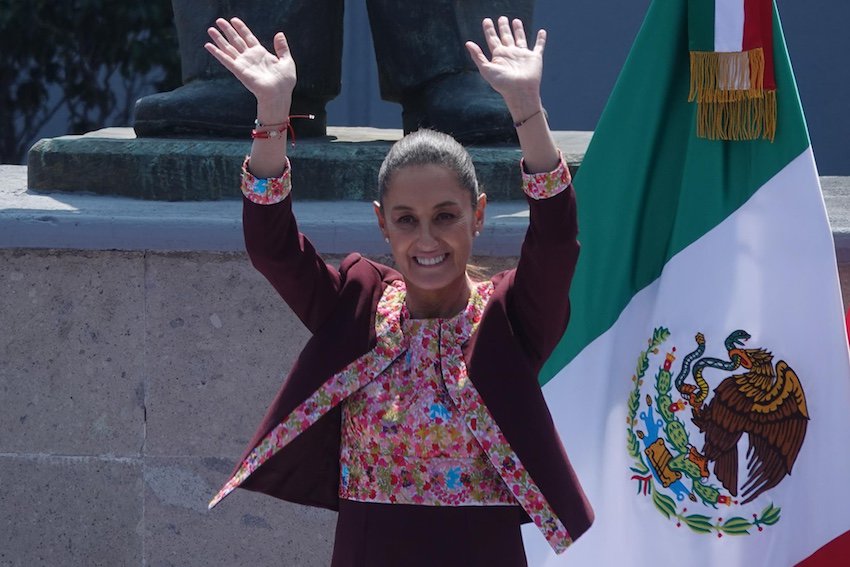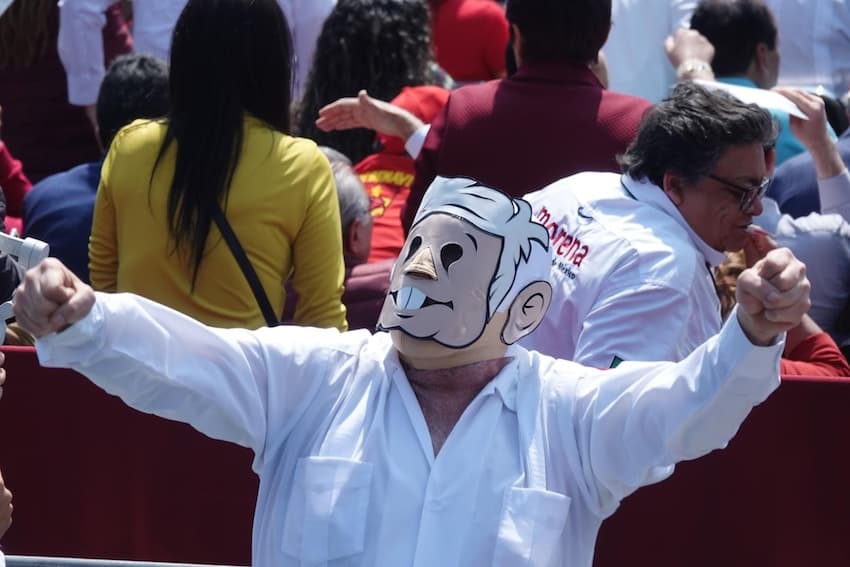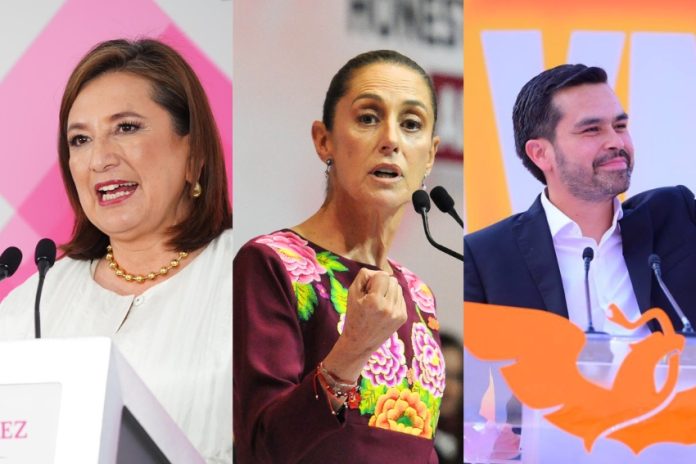Claudia Sheinbaum has a decisive advantage over Xóchitl Gálvez in the contest to become Mexico’s next president, according to the results of a new poll.
Just over three months before election day, a poll conducted for the El Economista newspaper found that Sheinbaum has 51.6% support, almost 24 points clear of Gálvez on 27.8%.

Jorge Álvarez Máynez, the candidate for the minor Citizens Movement party, is in a distant third place, with 5.1% support among 1,600 adults polled by the company Mitofsky between Feb. 17 and 20.
Support for Sheinbaum, who will represent the ruling Morena party and its allies in the June 2 election, increased 0.8 percentage points compared to El Economista’s January poll, while the percentage of respondents who said they would vote for Gálvez, the candidate for a three-party opposition alliance, increased by 0.9 points. Support for Álvarez Máynez declined slightly.
Sheinbaum’s advantage over Gálvez is even greater if the 15.5% of non-committed respondents are stripped out of the poll results. In that case, the former Mexico City mayor has 61.1% support, more than 28 points ahead of Gálvez, a former National Action Party (PAN) senator who will represent that party as well as the Institutional Revolutionary Party (PRI) and the Democratic Revolution Party (PRD) on June 2.
The official campaign period begins next Friday March 1. The new president will be sworn in Oct. 1.

Which presidential candidate is the most experienced, the most intelligent and “closest to the people”?
The poll respondents were asked to take into account what they know about the three candidates in order to respond to the following nine questions.
- Who is the most experienced?
- Who would make the best president of Mexico?
- Who is closest to the people?
- Who is the most intelligent?
- Who represents more of a change?
- Who would create more jobs?
- Who would attract more investment?
- Who is more honest?
- Who don’t you trust
Sheinbaum — a physicist and environmental scientist who was environment minister in Mexico City when Andrés Manuel López Obrador was mayor in the early 2000s — fared best on every question.
Over 50% of those polled said that the 61-year-old Mexico City native is the most experienced; would make the best president of Mexico; is closest to the people; and is the most intelligent.

Just under half of respondents — 48.5% — said that Sheinbaum represents more of a change than her two rivals, even though her election would keep Morena in power. Similar percentages of respondents said that the ex-mayor would create more jobs; attract more investment; and is more honest than the other two presidential hopefuls.
Only 18-26% of respondents cited Gálvez — a 61-year-old Indigenous Otomí woman who was a businesswoman before moving into politics — when responding to the first eight questions. The range for Álvarez Máynez, a 38-year-old lawmaker, was 3-7%.
Just under one in five respondents — 17.9% — said they don’t trust Sheinbaum, while the figures for Gálvez and Álvarez Máynez were 36.1% and 16.2%, respectively.
Desire for continuity greater than appetite for change
More than five in 10 poll respondents believe that it would be better for Mexico for Morena to continue governing the country, while fewer than four in 10 believe that a change of party is preferable.
Morena, officially the National Regeneration Movement, took office in late 2018 when President Andrés Manuel López Obrador won a comprehensive victory at the presidential election in July of that year. The president founded the party early last decade and it is now the dominant political force in Mexico, holding power in 21 of the country’s 32 federal entities. Morena is allied with the Labor Party and the Ecological Green Party of Mexico.

The percentage of poll respondents who believe that Mexico will be better off with a continuation of Morena rule — 53.4% — increased 1.9 points compared to El Economista’s previous poll.
Sheinbaum has pledged to build the segundo piso, or second story, of López Obrador’s so-called “fourth transformation,” or 4T, which has been characterized by things such as significant spending on welfare and employment programs, austerity in many other areas, a stated commitment to combating corruption and impunity and the construction of several large infrastructure projects.
Another tenet of the 4T is the president’s so-called “hugs, not bullets” security strategy, which focuses on addressing the root causes of violence over combating criminals with force. While the number of homicides last year was the lowest since 2016, total murders during López Obrador’s presidency — over 170,000 — is the highest of any six-year period of government in Mexican history.
The percentage of poll respondents who believe that Mexico would be better off with a different party (or parties) in power declined to 38.9% from 40.8% in the January poll.
The PAN was in power for the first 12 years of this century after Vicente Fox won the 2000 presidential election and thus ended over 70 years of uninterrupted rule by the PRI. Fox was succeeded by Felipe Calderón, who initiated a militarized “war” on drug cartels shortly after he took office in 2006. Homicides increased significantly during his six-year term, and continued to rise during the presidency of Enrique Peña Nieto, who was sworn in as president in late 2012, returning the PRI to power.
Peña’s administration was plagued by corruption scandals and severely tarnished by the abduction and presumed murder of 43 students in Guerrero in 2014. The previous government enacted a number of constitutional reforms, including one that opened up Mexico’s energy sector to foreign and private companies. In February 2014 — seven months before the 43 students disappeared — Time magazine put Peña Nieto on its cover and declared that he was “saving Mexico” as a result of his “sweeping reforms.”
After 18 years of PAN and PRI rule this century, and just over five years of a Morena administration, a majority of Mexicans — according to the latest El Economista poll and numerous others — believe that a continuation of the 4T under the leadership of Sheinbaum is preferable to returning to the past by electing the three-party coalition headed by Gálvez.
With reports from El Economista
